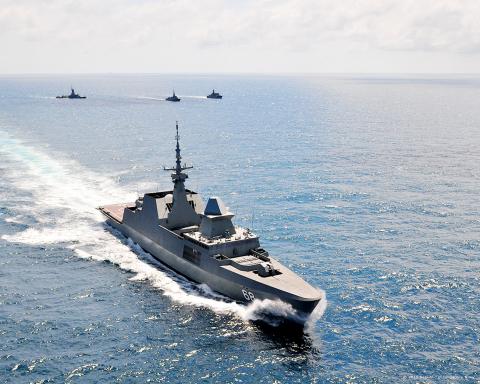The 40-year cooperation between the Republic of China Army and the Singapore Army may be at risk after the city-state sent 70 soldiers to China to an eight-day joint exercise with the People’s Liberation Army (PLA) on Sunday.
The Singaporean soldiers sent to China are from “Project Starlight,” an agreement reached between former president Chiang Kai-shek (蔣介石) and then-Singaporean prime minister Lee Kwan Yew (李光耀) in 1974 and ratified in 1975 under which Taiwan’s military helps train Singaporean troops in the so-called Starlight Exercises.
The government will closely monitor the joint exercises between the PLA and the Singaporean troops, the Ministry of National Defense said.

Screengrab from the Republic of Singapore Navy Web site
Whether the presence of the city-state’s troops at the Chinese military exercise signifies the termination of the Starlight agreement or that Singapore is changing partners from Taiwan to China remains to be seen, the ministry said.
To date, the Singaporean government has not made any changes to the pact and is continuing joint training with Taiwan, it added.
The ministry said it would try to ascertain whether the exercises with China are a one-off event, or if they represent the beginning of normalized joint military training between the two countries.
Ministry officials said that while the Singapore Army joined anti-terrorism exercises with China in 2009 and 2010, there was a significant difference between those drills and a string of recent ones.
Ministry officials said there has been a subtle shift in Singapore’s policy that has seen its army increase dialogue with its Chinese counterpart. The two sides conducted a joint military exercise in April, another in August and in September, the Singapore Army sent a company of troops to conduct joint exercises in the PLA’s Nanjing Military District, they said.
In addition to the increasing familiarity between the Singaporean and Chinese armies, the ministry said the Republic of Singapore Navy has also been reaching out to its Chinese counterpart.
According to the ministry, the Republic of Singapore Navy had sent one of its Formidable-class frigates — a derivative of the French Lafayette class — to attend an exercise with China, adding that as the Formidable-class is an upgraded Lafayette derivative equivalent to the Republic of China Navy’s Kang Ting-class, this interaction could affect future upgrades of the Taiwanese frigates.
The RSS Formidable attended a multinational naval exercise off Qingdao, China, in April, while the RSS Steadfast visited the People’s Liberation Army Navy South Sea Fleet.
The ministry said the nation’s Kang Ting-class frigates are nearing the time for crucial upgrades, which include increasing their vertical missile launch systems and replacing the MIM-72 Chaparral missiles they carry with domestically manufactured Sky Sword II missiles.
The Sky Sword II anti-aircraft missile system can be carried by platforms across all the military’s branches. The Chaparral missiles were originally made to be surface-launched anti-aircraft missiles and were developed by the US Army.
The possibility of China increasing its familiarity with Lafayette-class ships through interaction with Singapore’s Formidable-class vessels is a huge factor in determining if Taiwan’s navy will maintain its current upgrade plans or seek alternatives, the ministry said.

A Ministry of Foreign Affairs official yesterday said that a delegation that visited China for an APEC meeting did not receive any kind of treatment that downgraded Taiwan’s sovereignty. Department of International Organizations Director-General Jonathan Sun (孫儉元) said that he and a group of ministry officials visited Shenzhen, China, to attend the APEC Informal Senior Officials’ Meeting last month. The trip went “smoothly and safely” for all Taiwanese delegates, as the Chinese side arranged the trip in accordance with long-standing practices, Sun said at the ministry’s weekly briefing. The Taiwanese group did not encounter any political suppression, he said. Sun made the remarks when

The Taiwanese passport ranked 33rd in a global listing of passports by convenience this month, rising three places from last month’s ranking, but matching its position in January last year. The Henley Passport Index, an international ranking of passports by the number of designations its holder can travel to without a visa, showed that the Taiwan passport enables holders to travel to 139 countries and territories without a visa. Singapore’s passport was ranked the most powerful with visa-free access to 192 destinations out of 227, according to the index published on Tuesday by UK-based migration investment consultancy firm Henley and Partners. Japan’s and

BROAD AGREEMENT: The two are nearing a trade deal to reduce Taiwan’s tariff to 15% and a commitment for TSMC to build five more fabs, a ‘New York Times’ report said Taiwan and the US have reached a broad consensus on a trade deal, the Executive Yuan’s Office of Trade Negotiations said yesterday, after a report said that Washington is set to reduce Taiwan’s tariff rate to 15 percent. The New York Times on Monday reported that the two nations are nearing a trade deal to reduce Taiwan’s tariff rate to 15 percent and commit Taiwan Semiconductor Manufacturing Co (TSMC, 台積電) to building at least five more facilities in the US. “The agreement, which has been under negotiation for months, is being legally scrubbed and could be announced this month,” the paper said,

Japan and the Philippines yesterday signed a defense pact that would allow the tax-free provision of ammunition, fuel, food and other necessities when their forces stage joint training to boost deterrence against China’s growing aggression in the region and to bolster their preparation for natural disasters. Japan has faced increasing political, trade and security tensions with China, which was angered by Japanese Prime Minister Sanae Takaichi’s remark that a Chinese attack on Taiwan would be a survival-threatening situation for Japan, triggering a military response. Japan and the Philippines have also had separate territorial conflicts with Beijing in the East and South China